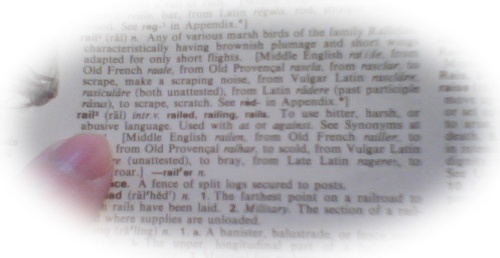No, not that kind of railing!
My general impression of the term railing has been one that has to do as much with content as with the tone and demeanor of the speaker.
The very day after hearing a definition that was milder than the one I’ve had, I had work-related occasion to check some book sources. Let me show you some of what I found.

OK, so it’s hard to read. See below.
Rail (verb)
- to complain vehemently about someone or something [McGraw-Hill Dictionary of American Idioms and Phrasal Verbs; copyright 2002]
- to utter bitter complaint or vehement denunciation [Dictionary.com Unabridged; based on the Random House Dictionary; copyright Random House, Inc. 2013]
- to express objections or criticisms in bitter, harsh, or abusive language. [The American Heritage Dictionary of the English Language, Fourth Edition; copyright 2000 Houghton Mifflin Company; updated 2009]
To rail isn’t just to express disagreement or correction. It isn’t even merely to complain or accuse. To rail can be those, if they are driven home with certain tones, attitudes, and dispositions.
In my research, I came to a milder definition for the noun railing in a 1913 Webster’s dictionary — “Expressing reproach; insulting.” Even it seems to require a desire and an intent to insult and demean.
But let’s go even further back by consulting Strong’s Concordance and its Greek dictionary. (But first, a look at an English definition of vilify — “To defame; denigrate.”)
The Greek verb translated railed on in Mark 15:29 and Luke 23:39 means “to vilify” (and especially “to speak impiously”). Here are three other facts about that Greek word
- Those two verses in the Gospels are the only verses where it is translated railed on.
- In ten other places it is translated with some rendition of speak evil of.
- The other twenty times it’s used, it is translated using blaspheme or a derivative (for example, 1 Timothy 6:1).
That Greek verb is blasphemeo, a very “sturdy” word. (See entry 987 in Strong’s Greek dictionary.)
The Greek noun translated railings in 1 Timothy 6:4 and railing in Jude 9 means “vilification.” Here are three additional facts about it:
- Those two verses in the Epistles are the only verses where it is translated railing(s).
- In one other place (Ephesians 4:31) it is translated evil speaking.
- The other sixteen times it’s used, it is translated blasphemy or some derivative (for example, Matthew 12:31 and Colossians 3:8).
That Greek noun is blasphemia and, like its verb above, it is very “sturdy” word. (See Strong’s 988.)
Railing is a banned speech pattern for Christians.
I want to be careful that I not speak that way. (I also want to avoid mislabeling another’s speech with it.)
Instead of having a harsh, abusive, disrespectful, bitter spirit that froths forth similar words, I want to be…
- compassionate
- loving
- tenderhearted
- courteous
I want to be a Christian who is true to his calling — to be and render blessing. Like this:
“Finally, be ye all of one mind, having compassion one of another, love as brethren, be pitiful, be courteous: Not rendering evil for evil, or railing for railing: but contrariwise blessing; knowing that ye are thereunto called, that ye should inherit a blessing” (1 Peter 3:8,9).
I cannot be that and do that, except by the indwelling Spirit of Christ. My brother and I cannot be “of one mind” until we both have the mind of Christ. (Do you think this is a tacked-on paragraph?)
